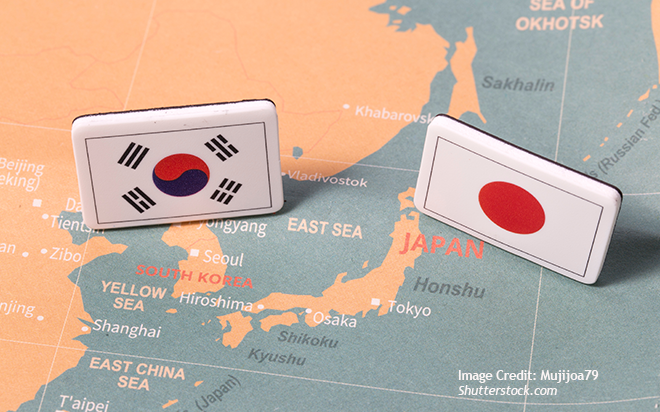Japan-ROK: Old Grievances under New Leadership

South Korea-Japan diplomatic relations have been worsening throughout the last few years, especially after Seoul decided to walk away from its agreement with Tokyo on the issue of comfort women and South Korea’s Supreme Court ruled against Mitsubishi and Nippon Steel Corporation in 2018. Trapped in the logic of the 1965 bilateral treaty wherein Tokyo and Seoul’s alliance with Washington and regional and national security reasons have been the main drivers of bilateral ties, the relationship seems to have hit an all-time low, as perceptions among South Koreans and Japanese show.
With the appointment of Fumio Kishida as Japan’s 100th Prime Minister last month, there was hope for a betterment or deepening of bilateral relations. This optimism derives primarily from two factors. First, Kishida is the leader of the Kochikai, the most diplomatic and liberal faction of the Liberal Democratic Party. Despite following the traditional Japanese political path in approaching South Korea, Kishida was expected to have a more dovish approach to Seoul than Abe or Suga. Second, Kishida played a primary role in brokering the Comfort Women Agreement between Tokyo and Seoul in 2015.
Japan-South Korea Diplomatic Game
Since Kishida’s appointment as Prime Minister, there have been positive and negative instances of engagement between Tokyo and Seoul. As early as September 29, the South Korean foreign ministry signaled a willingness to cooperate with the new Japanese government in a future-oriented manner. Moon Jae-in himself reiterated this sentiment during a phone call with Kishida, in which the South Korean president expressed his hopes to discuss deepening bilateral ties. After his appointment as Foreign Minister of Japan in early November, Yoshimasa Hayashi emphasized the need for Japan and South Korea to mend relations and step-up cooperation on regional security issues.
This followed Kishida’s first parliamentary address, wherein a restoration of bilateral ties to a “healthy state” was hoped for. On November 17, Choi Jong-kun South Korea’s first vice-foreign minister, and his Japanese counterpart Takeo Mori, were due to appear alongside US deputy secretary of state, Wendy Sherman, in a joint press conference. However, both ministers withdrew from the appearance due to a disagreement over the Dokdo/Takeshima issue – an unresolved island dispute under the 1965 treaty revolving around islands administered by South Korea, but claimed by Japan – after Kim Chang-yong, commissioner-general of South Korea’s national police agency, visited the islets on November 16. Both Japan’s chief cabinet secretary, Hirokazu Matsuno, and Masashi Mizobuchi, spokesperson for Japan’s embassy in Tokyo, underscored how this visit – the first by a South Korean police officer since 2009 – was unacceptable given that Dokdo/Takeshima are an inherent part of Japan’s patrimony reinforced by international law.
These interactions demonstrate how bilateral differences between Japan and South Korea still affect the relationship and how both governments tend toward maintaining standardized and hackneyed political paths of engagement. Kishida and Hayashi reiterated the Japanese leadership’s position that it is South Korea’s turn to take appropriate action and propose solutions acceptable for Japan. In other words, along the lines of the 1965 normalization treaty, also reiterated by Kishida in 2016, in his call with Moon and his second parliamentary address, all issues related to Japan’s colonial rule have been settled completely, and Tokyo does not need to take additional measures to solve these issues. Similarly, South Korea maintains its sovereignty over Dokdo and claims to have never been adequately compensated for the atrocities suffered under Japanese colonial rule, delegitimizing old treaties it views as invalid. The South Korean government has also been demanding the Japanese government send official apologies to wartime victims, despite previous condolences offered by Japanese officials since the 1960s.
Going Forward
Overall, Japan-South Korea relations remain deeply strained, and traditional bilateral approaches will seemingly remain unaltered. There is deep-rooted distrust of Seoul – given it has consistently overturned and abrogated bilateral agreements – in Tokyo. At the same time, Japan’s diplomatic importance to South Korea has decreased considerably. Disputes over resolving wartime issues seem to rest on the legal interpretation of previous agreements; South Korea does not deem resolution efforts satisfactory while Japan considers them to be enough.
To escape this feud Seoul and Tokyo both need leaders willing to go beyond 1965 logic and focus on practical and common objectives, such as regional stability, addressing the North Korea issue, and stabilizing the trilateral alliance with Washington. In Japan, the Kishida government might seem the perfect candidate, given his more diplomatic approach and Kishida’s and Hayashi’s own calls for practical solutions that Japan can accept politically, which shows the door for bilateral collaboration on some issues is still open. In South Korea, despite the Moon government’s openness to dialogue and collaboration, it is unlikely deadlocked relations will see any political breakthroughs.
There is, however, a chance for a change in bilateral dynamics once South Korea’s new President is elected next year. The two front runners are Lee Jae-myung, the presidential candidate of the ruling Democratic Party, and Yoon Seok-youl, the candidate for the conservative People Power Party. The former is expected to stay the course of the Moon government, seeking to improve relations with Japan, while expecting Tokyo to show a different approach to dealing with historical issues, especially the Dokdo/Takeshima dispute.
On the other hand, the conservative candidate might bring a change to the approach to the Japan-South Korea relationship. First, South Korean conservatives have consistently favored a better relationship with Japan and have been more practical in their approach than progressive governments. Second, Yoon Seok-youl himself has stated, multiple times, that he will work towards the restoration of close relations between Tokyo and Seoul, setting the Keizo Obuchi-Kim Dae-jung golden era as his benchmark. Yoon’s forward-looking approach would entail a bilateral grand bargain that would focus on resolving all issues between South Korea and Japan, namely comfort women, forced labor, security cooperation, and trade, which will please Japan given the pragmatism, politically empower the victims and the South Korean public and, in turn, the new government.